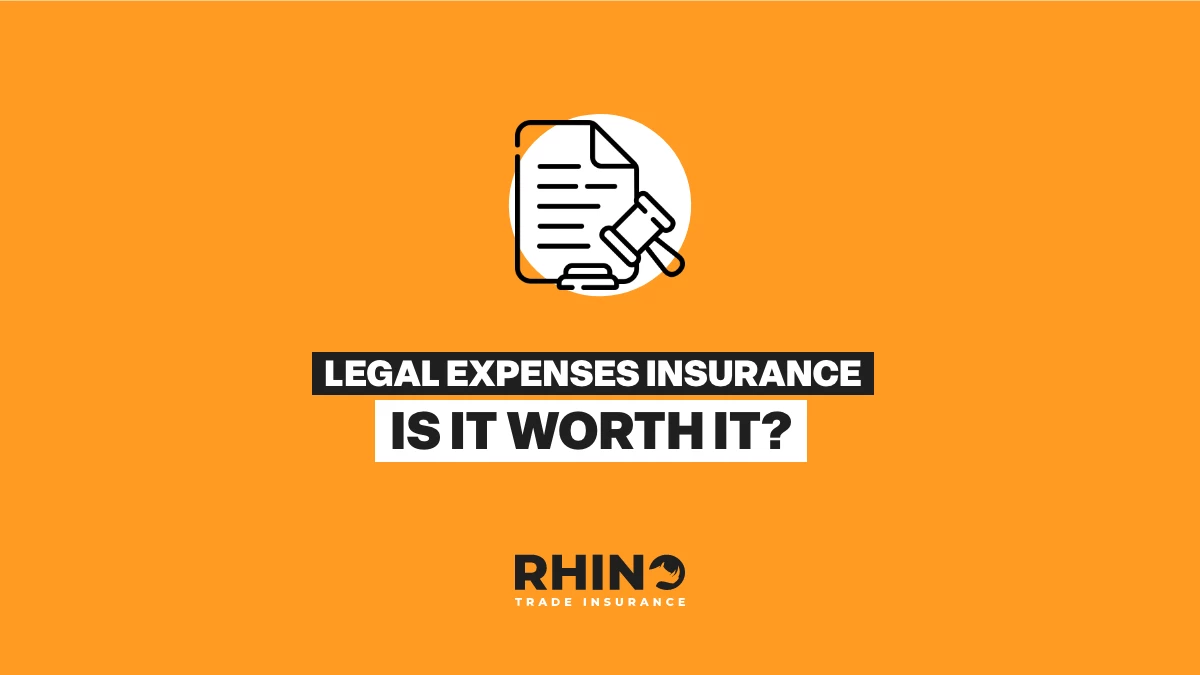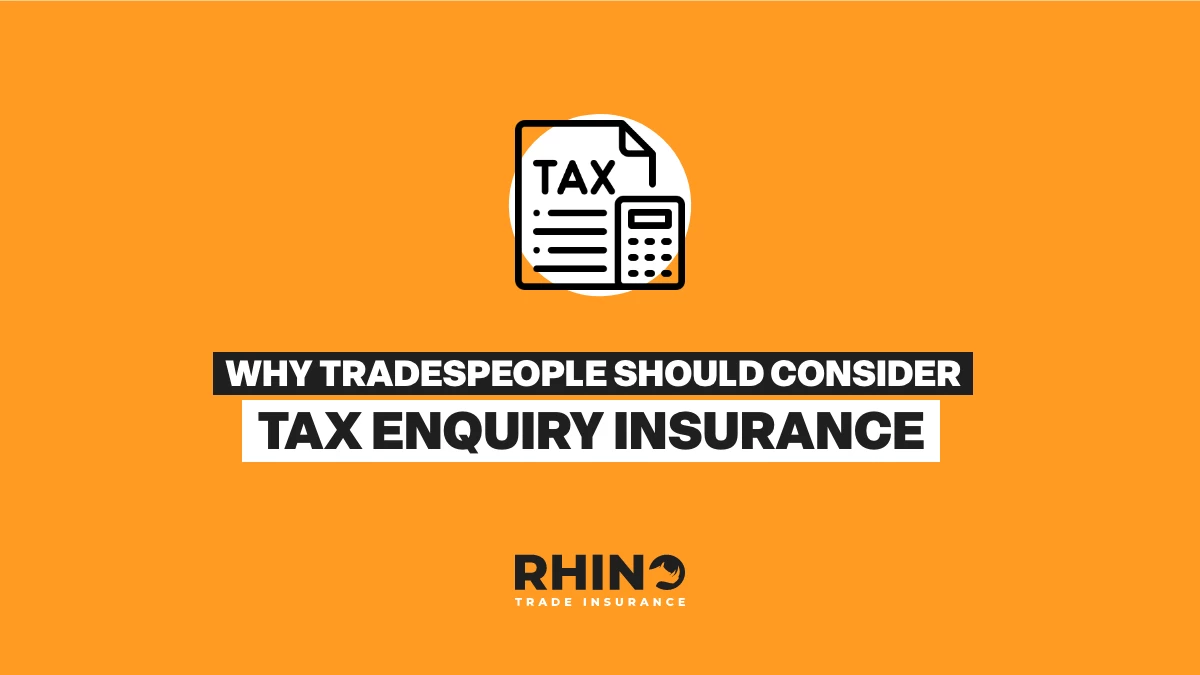
Legal Expenses Insurance – Is it Worth It?
Legal Expenses Insurance for tradespeople explained—what it covers, when you might need it, and how it protects against costly legal fees.
Thinking of setting yourself up as a self-employed tradesperson? It’s a brave step to take, and one that should lead to increased freedom and deliver a welcome boost to your finances if you play it right.
But you must know what you’re getting yourself into. Instead of drawing a monthly salary, you’ll have to organise your business finances yourself. Plus, there will be some significant initial expenses and plenty of unexpected costs along the way.
Let’s take a look at some of the key expenses to consider as a tradesperson.
Assuming you’re starting pretty much from scratch, here are the main areas to consider upfront:
A tradesperson is nothing without their tools, so this is an important investment required to be a tradesperson. What you’ll need will obviously depend on your trade, but you’ll be looking at an initial outlay of several hundred quid to get a collection of hand-tools together. When you start to add power tools, ladders and specialist equipment things get more pricey.
You’ll also need a pair of good work boots and industry-specific PPE, such as hard wearing gloves, hard hat, aprons, sheets and shoe covers.
Then there’s your work vehicle. Remember, the van you want and the van you can afford (at least to begin with) are two different things. Look to spend no more than around £3K on your first work van – if it carries your tools and gets you from A-B then it should be sufficient. Don’t forget your van insurance – more on that in the next section.
You’re going to need some initial stock, which again will depend on the nature of your trade. For example, if you’re a carpenter, you’ll need some basic materials like wood, nuts, bolts, glues and finishes. You’ll also need somewhere to store it all – which may be your van or garage to begin with. Don’t forget the cost of things like shelves and drawers to store your items. If you live in a flat or don’t have a van big enough, you’ll probably need to rent a storage unit instead.
Once you’re all set up, the costs don’t end there.
You should have trade insurance in place before day one of trading, otherwise you’re asking for trouble and a financially devastating liability claim before you’ve even got going. Trade insurance isn’t something you can cut corners on, as you’ll end up paying a higher price down the line when something happens.
These are your ongoing financial responsibilities as a tradesperson. Your business will come with certain overheads, and it’s important that you sit down before you set up shop and work out exactly what these will be. You’re going to need to cover your overheads each month before you even think about profit.
But what are they? If you have a business premises or storage unit, you’ll need to cover rent and utilities each month. Don’t forget regular auto maintenance and petrol for your van and keeping your stock and consumables replenished.
You might find that your overheads seem greater in the beginning, as you can’t spread the cost over lots of different customers. For example, you’ll still need to repair your van if you’ve got five customers a month or fifty.
A busy tradesperson needs a good accountant. You can save by going with an online-only accountant, but this is still an unavoidable expense. Luckily, they’ll be able to help set you up with a streamlined bookkeeping system and hook you up with time-saving software solutions, so you don’t spend every evening up to your neck in paperwork.
Your accountant will also help you make sense of what you can write off as a business expense for tax – such as your Public Liability Insurance for example.
Marketing costs like paying for a website domain name, and creating printed flyers or business cards, as well as getting your business on a good online trade platform like Book A Builder will be ongoing costs to consider.
It goes without saying that if you’re planning on hiring people in your trades business, you’re going to need to pay them. Employee wages and benefits should all be done in accordance with HMRC and will be a regular anticipated expense.
These aren’t your regular running costs of a trades business, but the costs you may forget to budget for. Don’t make this mistake – a rainy-day buffer and a safety net of solid insurance are your best friends.
Be it a van breakdown or power tool damage, you are going to need to regularly dip into your business profits to keep everything running smoothly. A good van insurance policy and tool cover will help shield you from large unexpected replacement costs.
Tool theft alone is a constant threat to tradespeople in the UK, and it can be even more damaging if you’re just getting yourself established. Tools are stolen every 28 minutes in the UK and replacing a kit can be extremely costly. Tool insurance will prevent this from impacting your finances, but without it, you’re vulnerable to this ongoing cost.
If the last few years have taught us anything, it’s that supplies coming into the UK aren’t at a fixed cost. Market fluctuation due to environmental, political or economic factors are a fact of life – and you never know when one of your core materials is going to soar in price.
If you’ve got a contracted work half-finished and the whole thing gets vandalised or goes up in flames, who do you think is going to have to take the financial hit? You! Unless of course you’ve taken out Contractors All Risks Insurance. It pays to know which insurance policies you need to protect your business – give Rhino a call today and we can help guide you towards what you actually need.
A tradesperson needs to constantly look for opportunities to upskill, which usually pays off in the long run, but can cost you in the short-term.
Like any industry, trades are constantly evolving. What was the latest technique yesterday may no longer be in demand tomorrow, and rules and regulations are consistently updated to reflect new safety and eco standards. Whether it’s plastic pipes instead of copper in plumbing or the rise of underfloor heating or solar panelling, it pays to keep up to date in your trade. However, the cost of courses and upskilling is something to consider.
It's not enough to simply be outstanding in your trade. Going it alone means running a business just as much as delivering your jobs to a high standard. Your success as a tradesperson will depend just as much on your canny budgeting abilities, willingness to listen to your accountant and foresight in planning for the unexpected as it will on your wonderful work.
We hope this article has been helpful in giving you an idea of the costs of being a tradesperson. Remember, here at Rhino we deal with hundreds of self-employed tradespeople every day and are always on hand for a bit of advice should you need it. We know everything there is to know about managing risk in the trades, and our award-winning service will ensure you never feel that you’re out there all alone.
Give Rhino a call today on 0115 243 7904.
Legal Expenses Insurance for tradespeople explained—what it covers, when you might need it, and how it protects against costly legal fees.
Worried about a tax investigation? With HMRC cracking down in 2025, Tax Enquiry Insurance from Rhino gives UK tradespeople expert protection and peace of mind.
Rhino Trade Insurance CEO Troy Stevens joins industry leaders at the House of Commons to discuss the rising issue of tool theft—highlighting its impact on UK tradespeople and the importance of awareness and protection.
Tell us your trade and get a tailored insurance quote for your business in seconds
Our team of experts are available to talk to Mon-Fri 08.30-17.30 and Sat 10.00-14.00

